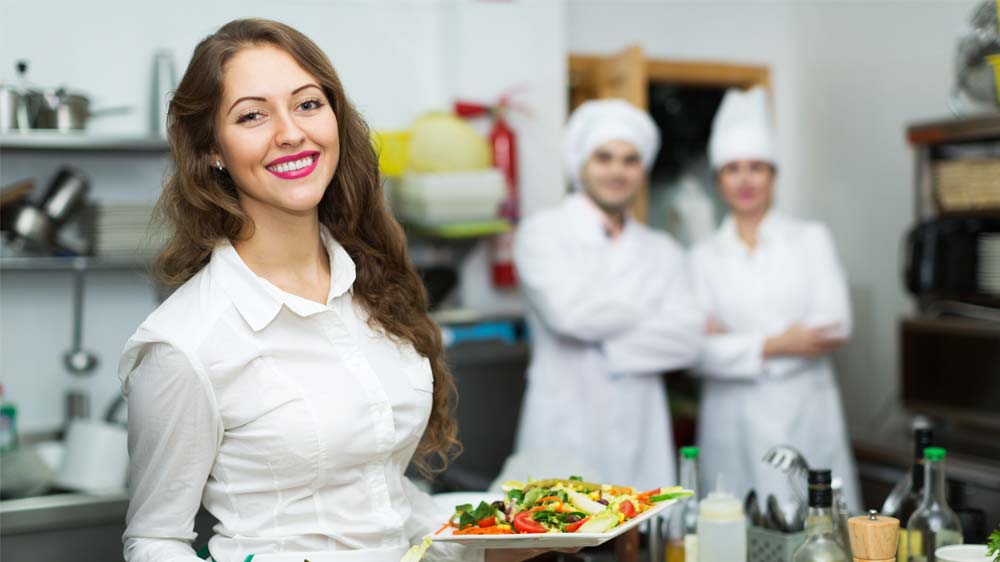
While everyone is going gaga over the discount month, where E-commerce giants like Amazon and Flipkart are giving away massive discounts and steal deals, the Hospitality sector is not left behind. Restaurants, hotels, and cafes in Delhi are offering exclusive discounts this month to invite more customers this festive season.
Hilton Garden Inn, Saket is offering a 20% discount on private party bookings at their bar, High Spi Rits until the end of October. This is the first time they are offering this discount to invite and cater to more customers. Sourabh Chandna, Assistant F&B Manager at Hilton Garden Inn says “During festive season people do go out shopping and meet their family members and celebrate together all the festivals. Also, our property is strategically located in the Saket market surrounded by malls, which gives us an edge to offer more lucrative deals. Not only in Saket but Hilton Garden Inn has the same discount at its Gurgaon branch too, which is valid by the 31st of October.
Meanwhile, Radisson Blu Atria in Bangalore has a special discount buffet with festive desserts along with mocktails, beer and a selection of other alcoholic beverages. It is priced at a special discounted rate of Rs 1999 per person. This exclusive discount is valid until the 31st of October.
Liston Johnson, F&B Manager, Radisson Blu Atria, Bengaluru says, “Footfalls usually are good around the festive season. People like to plan various lunch and dinner group parties and often they search for some great deals to plan it. Now, the trend is changing as people are going out and eat instead of cooking a traditional meal at their homes.” He further adds “We have specially crafted the menu and pricing for this festive season. Also, we are doing special Diwali Gift Hampers at great pricing, which gives customers a good deal if they buy out in bulk as it's loaded with Chef's special cookies, chocolates, and greetings.”
Cafés are launching festive collection to make the most of the festivals. Since, the festival of lights, Diwali is around the corner when people buy gift hampers, cafes are offering an exclusive collection of delicacies. For example, L’Opera, which is a French Pâtisserie, Boulangerie and Salon de Thé (Tea Room) and has over 18 points of sale across Delhi-NCR and Dehradun, has curated limited edition festive gifts and hampers that comprise authentic French delicacies such as Macaroons, Biscuits, Chocolates, colourful Dragées, Florentines, Tea Cakes, Preserves and exotic Teas in various combinations. These gift hampers can be customized to suit your requirements.
Dragées are yet another most popular French delicacy. Coated in the finest chocolate, these tiny balls of chocolate are available in flavors of Coffee Almonds, Cranberries, Salty Pistachio and come in beautiful L’Opéra jars. “Our limited edition gift hampers comprising authentic and the most refined French delicacies will ensure that you make a lasting impression on your friends, family, and colleagues,” says Laurent Samandari, Managing Director, L’Opéra.

The center point of the Indian hospitality sector is the buffet. Across the Indian subcontinent, the all-you-can-eat model is a renowned dining tradition, from corporate events and breakfast service at five-star hotels to lavish wedding banquets (shaadis). But running a busy buffet in India calls for a degree of decorum and cultural awareness that goes much beyond just restocking chafing dishes.
The performance of your staff at the buffet has a direct influence on customer satisfaction, online reviews, and, eventually, the bottom line of your business in the fiercely competitive Indian hospitality sector. In addition to ensuring operational effectiveness, a well-trained staff maintains the high standards of hygienic practices and cultural sensitivity that Indian customers demand.
This detailed article breaks down the key components of a Buffet Etiquette Training Program tailored to the Indian setting. You will elevate your service from basic to excellent by investing in this training, making your restaurant a model for Indian Buffet Service Standards.
Read more: How to Start a Buffet Restaurant
Module 1: Mastering the Indian Culture (The ‘Right’ Way to Serve)
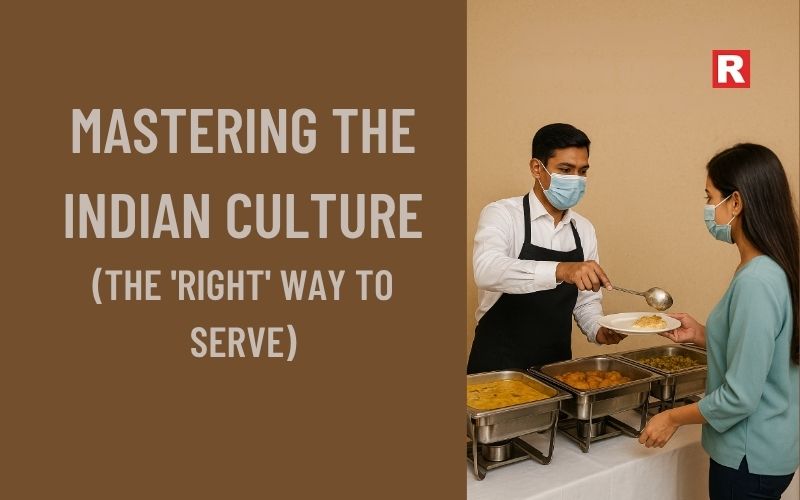
Without initially developing a broad understanding of the different social and cultural customs that control dining in India, training cannot be effective. These standards define what constitutes "good service" and shape customer expectations.
The Concept of Jootha (Contamination) and Hygiene
A basic rule of Indian dining is to avoid jootha, which means "contaminated" or "touched by the mouth/saliva." Staff must make every effort to reduce the possibility of potential contamination, even if customers are aware that a community buffet involves sharing utensils.
Training Instructions:
- The "No Touching" Rule: This rule states that staff must be strictly instructed not to handle or change food with their bare hands, even when wearing gloves, unless they are actively placing food on a guest's plate.
- Timely Utensil Replacement: A dedicated staff member, sometimes referred to as the "Buffet Marshal," is required to keep a close eye on serving spoons and tongs. A service member is required to quietly and promptly swap out any contaminated serving utensils with new ones if a guest accidentally serves themself with a personal fork or spoon. This needs to be done without attracting notice or making the visitor feel uncomfortable.
- HygieneTheatre: Visitors must witness the dedication to cleanliness. Employees should be instructed to regularly and briefly sanitize the sneeze guard's edges and the outside handles of chafing dishes.
The Right Hand Rule and Guest Interaction
The right hand is typically used for eating in various regions of India, whereas the left hand is kept for personal cleanliness. Although cutlery is accepted in modern contexts, staff members are slightly affected by this cultural norm.
Training Instructions:
- Serving and Clearing: When providing a napkin, pouring water, or delivering a guest's plate, staff members must always use their right hand. Even if the guest is using utensils, this demonstrates respect for the custom.
- Placement of Cutlery: When clearing a table, employees should be instructed not to use the same hand they could use to give a new visitor a fresh napkin to handle the filthy cutlery and plate. They ought to make use of a tray or an independent, special service cloth.
- Anticipation of Needs: Employees have to be trained to pay attention to a customer's preferred method of eating. The staff should be prepared to give a finger bowl (katori) right after the main course, without being requested, if a visitor is mostly using their hands for bread and dry dishes.
Know more: Why the Buffet is the Perfect Meal for Corporate Events
Module 2: Presentation and Flow (The Visual Experience)

The food is the décor at a buffet. Inadequate presentation results in food waste, untidy appearance, and a low-quality impression. This lesson focuses on the operational excellence needed to keep the layout neat and orderly.
Buffet Setup and Logic
The buffet's layout has a significant impact on how guests move around it and how many plates they eat. An inappropriate arrangement can cause chaos and congestion.
Training Instructions:
- Traffic Flow Mastery: A logical flow should be expected in the training:
- Cutlery and plates (the first point).
- Salads and appetizers (cold part).
- Rice, naan, and other breads and staples are basic foods.
- vegetarian mains and curries.
- non-vegetarian mains and curries.
- drinks and desserts.
- Segregation: The Vegetarian/Non-Vegetarian V/NV Divide: In India, this cannot be negotiated. Employees need to have extensive training to:
- Make sure that the V and NV areas are physically separated by using different mats, serving spoons, and even trays and serving cloths of various colors.
- Each dish needs to have a clear label that states whether it is Veg (Green Dot) or Non-Veg (Red Dot). During each shift, employees must check the labels.
- Management of Chafing Dishes: Employees should be instructed to never leave a dish empty. The half-full sign must be their signal to restock. On the buffet line, replenishment must always be done from the kitchen (using a fresh, hot container) rather than by mixing new food with old, which poses a serious hygienic danger.
What's new: Personalizing the Buffet: Why A La Carte Add-ons are Your Next Big Opportunity
Aesthetic Maintenance
The buffet's aesthetic appeal is a clear representation of the business's brand.
Training Instructions:
- The "Five-Minute Sweep": This involves teaching staff to visually inspect the buffet line once every five minutes. Their objective is to tidy up:
- Spilled sauce or gravy on the counter or sneeze guard.
- Food particles that are at the borders of the chafing dish.
- The mess that visitors leave behind after serving themselves.
- Garnish Refresh: To make the meal appear freshly prepared, teach workers how to swiftly and artistically change the garnish (for example, adding a few chopped almonds or a sprinkle of fresh coriander).
- Temperature Checks: Establish a Temperature Log Standard Operating Procedure (SOP) for temperature checks. To guarantee food safety and quality, an authorized staff member must check and record the temperature of hot and cold meals every two hours. India places a lot of emphasis on this important aspect of hospitality staff training.
Module 3: Active Service and Guest Interaction (The Hospitality Touch)
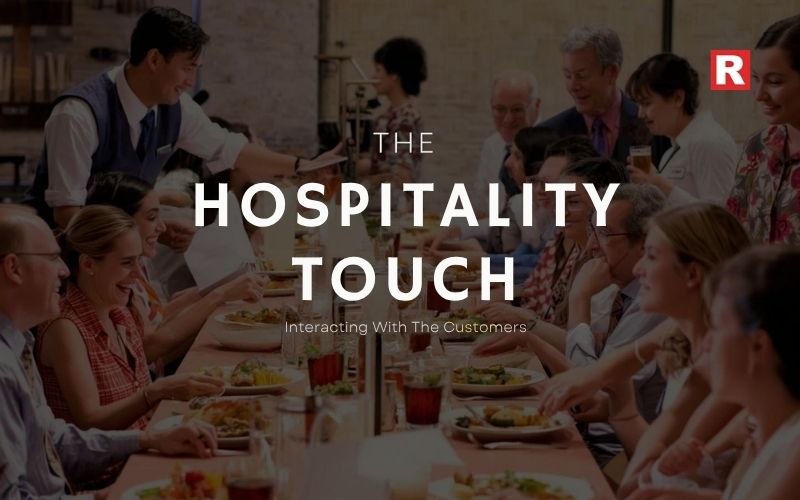
A well-functioning buffet is assisted service rather than self-service. The employees must continue to be present and engaged on the floor, offering a customized experience.
Proactive Table and Floor Management
Tables fill up and clear fast during an Indian dinner. Staff must be efficient and attentive to this.
Training Instructions:
- The 30-Second Clearing Rule: Teach employees that once a guest leaves their seat, a used dish needs to be removed from the table within 30 seconds. The atmosphere is ruined when used dishes are left to stack on service stations or pile up on the table.
- Water & Drink Service: Employees need to watch out for water glasses. They should be taught to never allow a guest's glass to run empty before approaching, and to offer to replenish it when it is half-empty.
- Managing Particular Requests: Employees should be aware of typical dietary requirements:
- Asking: "Is there anything you would like prepared fresh from the kitchen, such as a plain dosa or a roti?"
- Allergen Awareness: Being aware of certain Indian foods, such as dairy or nuts (cashews in gravy), includes common allergies.
The Art of Directed Assistance (The ‘Ask’)
A skilled employee is aware of when they should step in and offer assistance.
Training Instructions:
- Guiding the Unknown: Train staff members to recognize visitors who are confused or having difficulty (such as an elderly person or a visitor who is not familiar with the cuisine). Staff should be trained to say something like, "May I help you with a selection or suggest the popular dishes today?" when they approach.
- Portion Control Etiquette: Managing waste without coming off as impolite is the most challenging part. Employees should be taught to help customers serve in a subtle manner, particularly when it comes to expensive or wasteful foods (such as some desserts). Emphasizing "small, fresh portions" and offering to have a second helping later should be the main goals of training.
- Phraseology Example: Teach the staff to say, "Chef recommends having a small portion of this dish while it's piping hot," rather than, "Don't take so much." Could I give you a little? You can always come back at any time for more.
Check out: Essential Buffet Equipment for a Seamless Service
How to Train Your Staff to Spot Bad Seafood in Five Easy Steps
Module 4: Standard Operating Procedures (SOPs) and Continuous Learning
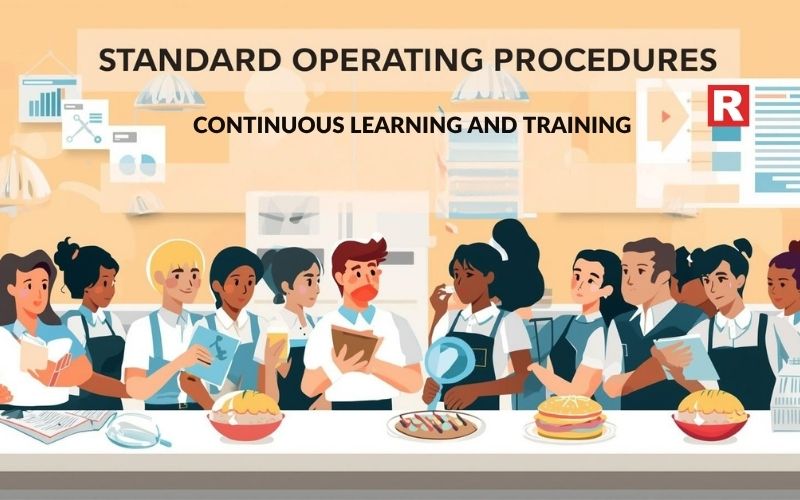
Reliable, consistent processes are the key to excellence. A good Buffet Etiquette Training India curriculum is built on SOPs.
The Buffet Staff Manual
There must be a brief Buffet Service Standards Manual available to all employees, from the F&B Executive to the most recent hire.
Key SOPs to Detail:
- Configuration and Presentation SOP: A checklist for V/NV separation, flow, advertising, and plate placement.
- SOP for Replenishment: The precise process for replacing chafing dishes (using only new containers from the kitchen) and performing the required temperature checks.
- SOP for Breakdown and Waste Management: How to handle and record leftover food securely while making sure all equipment is cleaned right away.
- SOP for Personal Hygiene and Uniforms: Tight guidelines for neat, ironed uniforms, short or tied hair, clean hands and nails, and little or no jewelry. In order to avoid cross-contamination at Indian buffets, this is essential.
Training Methodology
Training needs to be interesting, useful, and continuous.
- Role-Playing Scenarios: Hold mandatory role-playing meetings once a week. The scenarios have to center on difficulties encountered in actual life:
- Situation: A visitor complains that the paneer is too chilly.
- Situation: A visitor is using their used spoon to serve a scoop of rice straight into the main sauce.
- Situation: A queue forms as a huge group of twenty people arrives at once.
- The 15-minute "Daily Huddle": A brief pre-shift meeting to go over a single training topic (for example, "Today's Focus: Immediately clearing all used napkins from the table") and discuss any recent negative feedback or customer comments.
- Cross-training: Educate front-of-house workers on kitchen practices and vice versa. The serving staff must be aware of the food's hygienic and temperature restrictions, and the kitchen staff must understand the buffet's aesthetic standards.
Learn more: 7 Essentials to Keep Staff Trained in Your Restaurant
Elevating the Indian Buffet Experience
In India, teaching your employees buffet etiquette is an essential investment rather than a one-time cost. The Indian customer places a high value on politeness, cleanliness, and cultural sensitivity.
Your restaurant will provide an exceptional and unforgettable dining experience by putting in place a systematic program that emphasizes cultural sensitivity (jootha management, V/NV separation), operational accuracy (temperature control, logical flow), and proactive hospitality (the 30-second clear, directed assistance). This dedication to quality elevates a simple dinner into an elegant display of hospitality, generating favorable internet feedback and solidifying your standing as a pioneer in high-end hospitality staff training in India.

Ayodhya's tourism is getting a big boost as three well-known hotel chains - Radisson, Taj, and ITC - are coming to the city. This is because more and more people are visiting Ayodhya for its historical and religious significance. The new luxury hotels will not only show that Ayodhya is becoming a popular tourist spot but also help in the city's economic and infrastructural development.
Taj's Arrival:
Taj, a famous luxury hotel group, is also entering Ayodhya with a premium hotel. Taj is known for its impressive architecture and excellent service, and its presence in Ayodhya will add a touch of luxury to the city's tourism. Taj is planning to have two hotels – one under the Vivanta brand and another Ginger hotel.

Radisson's Plan for Ayodhya:
Radisson, a well-known hotel brand, is getting ready to open a luxury hotel in Ayodhya. The hotel is expected to have top-notch amenities, blending modern comforts with a traditional touch. Radisson aims to provide a unique and immersive experience for travelers looking for luxury in Ayodhya.

ITC's Sustainable Luxury:
ITC Hotels, known for their focus on sustainability and luxury, are joining Ayodhya's hospitality scene. The ITC hotel in Ayodhya will prioritize eco-friendly practices while maintaining high-service standards.

Cygnett Hotels & Resorts:
Cygnett Hotels & Resorts is also bringing a new hotel to Ayodhya, called Cygnett Collection KK Hotel. It has 41 rooms, each designed with modern amenities and stylish details.
"We are thrilled to establish our presence in the spiritually significant city of Ayodhya. With the completion of the Ram Temple in January 2024, Ayodhya is poised to become a global tourism hub and spiritual center, attracting visitors from all corners of the world. Prime Minister Shri Narendra Modi envisions Ayodhya as a must-visit destination for future generations, making this the perfect time for Cygnett Hotels & Resorts to enter the Ayodhya market. We are excited about the growth prospects in terms of both tourism and infrastructure development," said Sarbendra Sarkar, Founder & Managing Director of Cygnett Hotels & Resorts.

The arrival of these luxury hotels is not just good for tourists; it's also a big boost to Ayodhya's local economy. The hospitality sector creates job opportunities and supports local businesses. The collaboration between these hotels and local suppliers will contribute to Ayodhya's overall growth. The decision by Radisson, Taj, ITC, and Cygnett to open luxury hotels in Ayodhya shows that the city is becoming more popular among tourists. As the hospitality sector invests in the city's development, Ayodhya is on its way to becoming a destination for both spiritual seekers and those looking for luxury experiences.

According to NRAI India Food Services Report 2019, the country's economy is firmly set on a growth path, with its GDP rising to 7.1% in 2018 and expected to reach growth by 2023. With factors such as urbanisation, rising income levels and improved investment climate, the foodservice sector has a huge opportunity. The sector has observed a tremendous development in the past three years, which grew at 11 CAGR during 2015-16 to 2018-19. The sector is estimated at Rs 4,23,865 crore in 2018-19 and is projected to reach Rs 5,99,784crore at CAGR of 9% by 2022-23.
Post-election results, the food and beverage (F&B) industry, especially the restaurant segment, is hopeful of the changes the newly-formed Government of India will bring forth.
GST in the Restaurant Industry
Mihir Desai, Co-founder, The Bar Stock Exchange, says, "In the interest of the F&B industry, the new Government must review the GST rates for our industry from 5% to 12%; by allowing ITC (Input Tax Credit), the Government, in the last term, brought down GST Tax considerably down from 18% to 5% and disallowed ITC for restaurant industry. The new GST norms increased the cost on rentals, assets, royalties and fixed cost. Whereas the customers are charged 5% GST. Further, restaurants pay 18% GST on rentals, assets and fixed cost. We would like to request the Government to look into this as this has impacted the growth of the F&B industry."
Single-Window Clearance for Licenses
Vikrant Batra, Founder, Cafe Delhi Heights and Nueva, says, “Last few years have been a roller coaster ride for the restaurant space. With many changes levied on the industry from GST to liquor licensing, stricter laws and more, we are hoping for some positive changes with the coming of the new Government.”
Vikrant Batra feels there should be single window clearance for licenses for the restaurant businesses. “We are expecting a boom in the travel and tourism industry, thereby, bringing in more tourists and well-educated travellers, providing a bigger and a better platform to our cafes and restaurants on the worldwide front. With increased transparency in the laws and government operations regarding licensing and taxation, the restaurant industry is hoping to benefit from the GST inputs similar to that of previous years, making it easy to run and innovate in the industry. Single-Window clearance for licenses and ease in the licensing process would be another expectation from our end. Benefits from CSR initiatives are also expected along with other benefits and respites for the industry from the newly-appointed Government of India,” he says.
According to Vikrant, “the food industry being one of the top contributors to the country's economy, also expects a positive hand from the government in topics related to employment taxes, etc.”
Chef Tarun Sibal, Director, One Fine Meal, Delhi, is also of the view that single-clearance window should be there. "The second term and a bigger mandate get me hopeful that the Food and beverage industry and Food and beverage entrepreneurs will see better days ahead in terms of policy procedures and the ease of doing business. A single window clearance for the restaurant industry, clearer and actionable norms, departments that guide instead of just audit should be on the cards," he says.
Closing Time of the Restaurants
On the contrary, Aditya Wanwari, Founder Partner, SHOR and Kale and Kaffe, feels it is good to reduce GST as it makes the consumers happy. He says, “A good thing that the Government has done is reducing the GST from 18% to 5%. This has made the customers quite happy.”
“What I expect from the new Government is that they should increase the closing time of the restaurants from 1.30 am to 3 am. This could also boost up the food and beverage business and more employment opportunities. If this is done, the employment rate would increase to a decent percentage. I would like the new Government to ease the BMC in terms of allowing outside areas/rooftops to serve food and beverage. The licensing should be done and regulated online to avoid tedious paperwork,” adds Aditya Wanwari, Founder Partner, SHOR and Kale and Kaffe.
Pro-business Reformist Policies
Kausshal Dugarr, Founder and CEO of Teabox, wants the Government to continue its pro-business reformist policies and simplify the Indian taxation system for the F&B industry. He says, “The expectation from the Government at a macro level is to continue its pro-business reformist policies and Make in India initiatives along with simplification of the tax system. As a home-grown global brand that sells to consumers in 117 countries, we would want the Government to support our journey of creating mega brands from India and help us cut the red tape we face in the export of food products, especially in B2C formats. In addition, we would want the Government to reduce transactional costs dealing with government agencies.”
Kumar Saurabh, co-owner, Lub Lub Lebanese, Gurugram, says, "Expectation from the new Government is to give ease of business by bringing in norms and policy which favours restaurant industry, i.e., reinstating input credit on rentals and allow loans for growing business on encouraging terms."
Gaurav Dewan, COO and Business Head, Travel Food Services says, "The potential growth of the travel retail sector lies with the development of railways, highways and aviation. The Rs 7500 Cr budget, set aside for railway redevelopment plans, is an indication to the potential that the sector holds for the travel retail industry. In the last term, the Government opened up the railway ecosystem and allowed the partial entry of private players in the sector. The growing railway network coupled with active private players within the sector will lead to the elevation of the travel retail sector to international standards. The National Highway Authority of India (NHAI) has also taken positive steps towards the development of the highway network in India through the Bharatmala scheme which has recently finalised highway contracts worth around INR 3 Trillion. This growth in infrastructure allows the travel retail industry to accommodate multiple private players, which will provide an impetus to the already growing highway segment."
Talking about the previous developments, Gaurav Dewan says, "While the industry has seen growth in the aviation segment, recent developments such as the grounding of Jet Airways has led to an imbalance in airfares which has affected the industry adversely. With new promises, we foresee proactive involvement from Government bodies to regulate such situations. Lastly, the re-introduction of the input tax credit for the F&B industry has been on the table for a while and effective implementation of the same would go a long way to provide stability. With such a robust leadership at the helm, we anticipate the Government to implement more positive policies and reforms to facilitate the industry's growth in the coming years."
Commercial Activities in Open Areas
Arpan Gupta, Founder & MD, Anglow, wants the Government to allow commercial activities in the open areas to generate more revenue from the businesses. He says, “If the Government allows commercial activities in the open areas(s) and terrace(s) that would not only add a huge amount to the restaurant industry’s growth but also generate revenue for the Government.”
He also feels, “The hospitality industry, like every other sector in the Indian economy, is liable to pay multiple taxes and with the GST coming in, the reduction of taxes on a bill has become a soothing site for the customers. But there is hardly any difference in the price they pay. Currently, restaurants can't claim the Input Tax Credit on the GST. So, the cost and taxes that a restaurant pays for its supplies are very high which in return leads to an increase in the basic price of a food item on the menu. We would like the new Government to allow us to claim Input Tax Credit (ITC), so that we, as restaurateurs can foredeal over our purchase and reduce our prices, so even the customers get the benefit from the application of GST.”
Policies in the Hospitality Industry
Amey Marathe, Vice President of Telangana Chefs Association and Founder & CEO at JSAMEY Biotech, feels there is a need to revive the policies in the hospitality industry too. He says, “I want Government to re-look at the policy’s pertaining to hospitality. Most of them are outdated.” Speaking about food safety law, he tells Restaurant India, “Food safety laws differ from state to state, proper training to food safety department is needed; chefs should be made part of these committees and for ease of business.”
Another issue is getting licenses for the restaurant business. He says, “People have run from pillar to post to get various necessary licenses and at the time the laws concerning them are also contradicting.”
Swachh Bharat Campaign for Restaurants Too
Amey Marathe, Vice President of Telangana Chefs Association and Founder & CEO at JSAMEY Biotech, further adds, “We need to make India a safer place to eat. Indians eat every day in lakhs of restaurants which have very low hygiene and sanitation; these practices are non-existent. Swacch Bharat needs to get into hotels and restaurants too.” Amey Marathe, Vice President of Telangana Chefs Association says he “would love to contribute and collaborate with the Government” for the growth of the industry.
Incubate Startups
Mithun Appaiah, CEO Innovative Foods Limited, Brand Sumeru, says, “The new Government must lay impetus on exports by opening new market opportunities for food brands to cater to large global demand. This, in turn, helps to improve our GDP and indirectly farmers to garner better pricing. Another key area is to incubate startups in the Agri-food space by ensuring they are provided with all the support to start, operate and scale their business.Also creating an environment with global exposure to bring technology as well as agricultural know-how into the food business.”

How did food happen to you?
A man is what he eats. There is nothing else in this world that stimulates all our five senses. Given the diversity, you could go on eating new cuisines everyday yet require 12 Lives to live to taste all the varieties available. And by then I am sure we would have explored more cuisines.
What was the whole idea providing consulting to restaurant brands?
I believe managing and operating a restaurant is an art. Having an educational background along with work experience with some of the most renowned brands in the industry like the Marriott group helps other restaurant brands in their growth. Hence, we as a hospitality company started taking up management for restaurants apart from our owned ones.
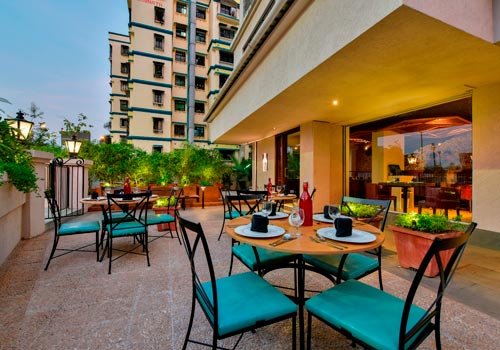
How is your service unique from others in the industry?
We believe in creating a human touch in everything we do. Our company offers a complete set of services required to run a restaurant or a hotel and with a bunch of young minds and experienced teammates, thereby making us unique.
When did you think of opening your own restaurant?
Having our own restaurant was always on my mind. However; in the beginning of 2017 I worked upon my dream project which had its own unique concept which involved a good amount of research work and a well experienced team. Once everything amalgamated we opened our first restaurant in May 2017.
How much money you have put in to come with this concept?
Well, the key is that you invest only the amount you are sure to get the return of. Feasibility study has to be very important. If you ever want to calculate a rough approx just multiply your sq. ft area with INR 8000. You should get an estimated figure to begin your work with. But remember, location is the most important thing here.
You change your restaurant menu every 14 days with one international and one Indian cuisine. What is the idea?
Mondo Fine Dine being my first restaurant, I wanted to have a unique concept which would educate people about various international cuisines. Hence, we started with the concept of changing our menu every fortnight.

How much do you believe in local and sustainable eating?
Firstly both the terms are not same. We use a lot of local vegetables which are bought and sold to us directly by the agri community from the forests. Have you ever tasted a smoked bamboo or something which is called chicken spinach? I believe more than anything, the ingredient has to be sustainable, cause remember everyone will taste it in the future.
What is your favourite part of playing with flavours?
I love breaking the flavors. It takes a lot of patience to find out the complimenting flavours which help in breaking the flavor. One has to keep in mind that he cannot play with the texture of the key ingredient of the star of the dish. He could end up finding a new complimentary flavour all together. As once we mixed Kafir Lime, Curry leaves and Sugarcane to create the highest selling drink of MONDO.

What trends you see going forward that will disrupt the food biz?
Molecular, Nitrogen foaming and Fusion. These started with complimenting flavours and now the texture and state of the dish is first decided before deciding the dish. I believe that ingredients should be given respect. They go through a lot before reaching your table.
What is your expansion plans?
I believe in moving forward slow and steadily hence, we are expanding slowly and shall be announcing about the same soon.

Two days after the railway budget brought hope to food lovers to get a bite of their favourite pizza and cappuccino in train, the much awaited budget by the BJP led government did not prove to be fruitful to the restaurant, hotel, FMCG or the food and retail industry as a whole.
With increase in the service tax, the government is expecting higher revenues making manufacturing and retail industry more competitive. But there is no good news for the food lovers in the country. With an increase in service tax at the restaurants and cafes where customers will have to pay now approximately 14 per cent in the country , eating out at your favorites brands like Lite Bite Foods, Subway, Pizza Hut, Costa Coffee, Pita Pit will make you pay more for your favorite Zinger Burger or the Falafel roll or the tasty Indian gravies at Zambar.
Hike in service tax would negatively impact QSRs as it is an extremely price sensitive market in an increasingly competitive market.
Commenting on the same, Gaurav Goenka, MD, Mirah Hospitality, believes, “The budget overall has been very positive keeping the growth of nation in mind. The only deterrent according to me is the increase in service tax to 14 per cent.”
“Inflation has always been a big cause of worry, directly affecting raw material costs which cannot be passed on entirely to the consumers. Biggest takeway from this budget is the proposed implementation of GST starting April 2016 which will eventually help curbing inflation along with other planned measures,” says Anun Dhawan, Pita Pit.
On the other hand, the tech-food industry which is seeing a robust growth these days will be badly affected by the budget proposal to levy service taxes for online and mobile advertising which experts believe will adversely affect the industry’s growth.
“Currently, India’s exponential mobile penetration and app consumption patterns are driving the growth of the mobile advertising industry and this development could hamper innovative efforts of the entire ecosystem comprising of mobile development start-ups, food tech start-ups advertisers and publishers. And we would love to have a more future focused policy regarding this particular aspect of the budget,” shares Zafar Rais, CEO, MindShift Interactive.
The upward revision of service tax may be detrimental to the growth of the hospitality industry. Now, consumers will have to spend more on the services which is going to reduce spend on eating out and consequently affecting growth of restaurant and hotel industry.
Meanwhile, the railway budget proposed by Suresh Prabhu is likely to spur growth of food industry. With announcement of tie-ups with brands like CCD, Domino’s, JumboKing and Subway, the travelers would now be able to choose their meal according to their taste without compromising on the quality.
The railway budget is progressive in its outlook and would open opportunities for the growth of the Indian food industry. The association of IRCTC with leading food brands is indicative of the evolving food preferences of the Indian consumers.
Commenting on the same, Harneet Singh Rajpal, Senior VP-Marketing, Domino's Pizza India, says, “ This is qualitatively a big opportunity and we are very positive about it, but we cannot ascertain it's quantum without a trial of consumer response to this new service and also logistical feasibility of delivering hot and tasty pizzas on train seats. We are doing a limited trial along with IRCTC on 19 trains and 12 stations. We would analyze the results after the trial and then move forward accordingly.”
“This is a win-win situation for all the stake holders, including passengers who would get an interesting and diverse menu to choose from and the partnering brands which will benefit in terms of sales, revenues and consumer outreach,” says, Manpreet Gulri, Country Head, Subway India.
The move will also bolster the perception of Indian railways as being tandem with growing consumer needs for quality and value-laden offerings. But there are still major loop hole that need to be covered up.
“They have made some announcements about the plan, but they don’t have clarity as yet, but if the government brings it in real it will be a very good option for passengers to get more healthy and hygienic food while boarding a train. But there is more refinement required, the supply chain is already there but the space at the station is major problem as the government has nothing concrete to offer,” shares Dheeraj Gupta, Founder and MD, JumboKing.
Thus, we can say that the Budget is positive in general for the corporate sector with government proposal to bring down Corporate tax levels to 25 per cent in four years time.
Pic Courtesy: PIB on Twitter

Hospitality industry has become the largest employer of women in the current date. According to a report published by Times of India (dated February 23, 2013) in south India and West Bengal, 55- 60 percent of the employees in hotels are women while in Maharashtra , Punjab and Delhi the figure is 40- 50 percent. The percentage is lowest in Jammu and Kashmir, UP and Bihar. With Mumbai being the financial hub of not just Maharashtra but the nation, it is but natural that a large chunk of hospitality jobs in the city, which has topflight hotels and airline operations are performed by women. Out of the 3 regions of study Karnataka shows the best result in this lot with 13.4 percent female and 86.6 percent male workers in this industry. West Bengal lies in the middle with 9.38 percent female and 90.62 percent male employees.
The hospitality experience would prove to be quite incomplete, without the charming smile of a woman at its outset. The feminine touch indeed lends grace and elegance to the hospitality industry. In fact, it would only be fair to say that the industry today holds more potential for women than ever before.
“At McDonald’s, we offer equal and diverse opportunities. No discrimination on sex, religion or socio economic background is done when we hire employees. Women also get equal and diverse opportunities. Having the right people at the right place in the right job is the motto of McDonald’s. We have a very extensive performance development system on individual career and development path. Thus women become an equal partner. We have 30-40 percent of women workforce in India,” says Smita Jatia, Managing Director Mc Donald’s India (West and south).
A report published by CSR says “Overall, more women are entering the job market. All HR managers that we approached confirm that the percentage of women managers in their company has increased over the past 5 years.”
Copyright © 2009 - 2026 Restaurant India.










